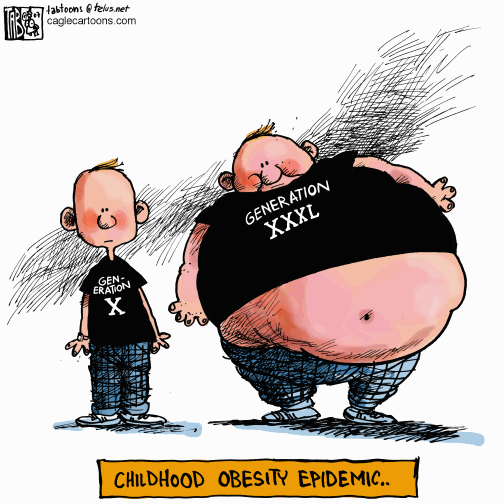BASICS
- Obesity is increasing at both a pre-adolescent and adolescent level.
- Poor concentration has led to a changed school curriculum.
- Increasing incidence of allergies.
- High carbohydrate load as simple sugars.
- Childhood Cancer incidence has steadily increased over the last few decades.
- Poor diets associated with adolescent depression.
Food Ideas to Help Yourself and your child.
The NoFructose Handout Starter Sheet is your take away summary of this web site. Read it at the NoFructose Starter Sheet area of this web site or download it.
IDEAS
The consumption of Sugar and Polyunsaturated Seed Oils combine in our diet to create inflammation in every blood vessel wall and in every tissue in every organ of the body – even before a child is born. The inflammatory process makes everything susceptible to damage and disease.
Childhood Cancer, Allergy and Autoimmune Disease
If the mother takes in a diet with Polyunsaturates Oils then that it will make its way into the embryo, foetus and then breast milk.
The potential damage for the child from polyunsaturated oil consumption may therefore be happening in the womb (in utero), continue on with breast milk and then be compounded as the child is weaned off breast milk.
Could this be a model for the rising incidence of childhood Cancer, allergy and Autoimmune disease?
Here is an area wide open for research.
- Poorer cognitive performance in children in all age groups tested from 3 years through to teenage years.
- Childhood obesity looks to be a predictor of longer term cognitive problems.
- Breakfast is a VERY important predictor of cognitive function, attention and memory in children.
- Obesity as an adult is associated with poorer cognition and a greater risk of Dementia.
- Diabetes and Metabolic Syndrome increase the likelihood of poorer cognition and Dementia.
- Obesity in middle age is associated with a more rapid decline in cognition and Dementia.
- Obesity and hypertension in aging males was a poor predictor.
- Several rat experiments point towards fructose and sucrose but not glucose affect memory, object recognition and cognition. One human study supported this.
- ‘Added sugar’ in the diet rather than fruit and vegetable sourced fructose was implicated.
- Simple rather than complex carbohydrates may impair memory performance.
- Omega 3 Fatty Acids may have a protective effect on the fructose effect on cognition in rats.
- Human consumption of fish once per week reduced the risk of Alzheimer’s Disease.
Inflammation may be the mechanism of action which fits completely within the NoFructose model of Fructose, Polyunsaturated Fats and Processed Grains creating the ‘Perfect Storm’ of inflammation in every organ of the body.
‘Crack’ Children’s Parties.
Have you ever looked closely to see what happens at a children’s party when they are given high sugar loaded food? There is a degree of hyperactivity which is followed often a few hours later with tiredness and irritability.
The highs and lows following on from a sugar load may be a contributing factor to society if we were to then give everyone sugar three meals a day in the current load. Could this be a possible explanation of our anxiety, depression and general irritability in society?
Children’s school educational curriculums have been adjusted over the last several years. Most of the core subjects of Maths, English and Science are taught in the time between the beginning of school and lunchtime. It was recognised by teachers in both junior and senior school institutions that children’s ability to concentrate decreases significantly in the period after lunch time.
It is regularly observed that there are significant numbers of children who are excitable in the afternoon and another lot who are irritable. The overall lack of concentration means a significant change in school curriculums has occurred.
It does not seem to be that anyone has actually worked out as to why that is, apart from the consideration that children who do not get a good breakfast prior to coming to school seem to be in a worse situation with regards to concentration.
Herein lies part of the solution. Some schools are serving breakfast now for students but the school canteens are also laden with fructose material which can include lollies, fruit juices and soft drinks. They also include dried fruits which also have a very high fructose load.
Mental Health
Recent review literature of mental health in adolescents has shown implications to diet. High sugar load and processed food diets are associated with depression and the role of diet is being considered now in mental health disorders.
MORE INFORMATION
A mother first, and health professional second has recently let me know about her families journey down this path. For her daughters sake she asked me not to mention her by name. In her words..
‘Our youngest daughter is autistic and as lots of parents do, we searched high and low to do everything we could for her. Our search changed all our lives. A dynamic dietitian in Melbourne introduced us to the concept of withdrawing gluten, dairy, sugar and soy.
Within 5 months I had a changed little girl – she went from only ever eating ‘white’ foods to requesting sushi. Her developmental gains were unseen by many specialists.
This prompted our whole family to make big changes. We are all sugar, gluten, soy and seed based polyunsaturated oil free with minimal dairy.’
This lady continues on her letter to me that she has personally lost 25 kgs and is studying a Nutrition degree. She is as frustrated as I am when she ‘now sees’ the problems around us that are related to what we eat.
I keep hearing stories like this every day and some like this one just give me goose bumps.
I am not saying for a second that sugar is the cause of autism but dietary changes can affect us in a variety of ways. This was just a story that came my way.
In the meantime it costs nothing for us to give up the sugar and polyunsaturated oils for a couple of months and see what happens. No cost and no side effects. I don’t know of anyone who goes back to their ‘old” ways once they see the benefits.
Encourage a few more around you. It feels good to be helping others.
Read about the Damage Process
Read about the Metabolism
Read about the Health Issues
Food Ideas to Help Yourself and your child.
The NoFructose Handout Starter Sheet is your take away summary of this web site. Read it at the NoFructose Starter Sheet area of this web site or download it.
Please add information by going to Contribute to NoFructose.com
ARTICLES
Depression, diet and exercise. FN Jacka and M Berk. Medical Journal of Australia Open 2012; 1 Suppl; 21-23 doi; 10.5694/mjao12.10508
High Levels of Both n-3 and n-6 Long-Chain Polyunsaturated Fatty Acids in Cord Serum Phospholipids Predict Allergy Development by Malin Barman et al in http://www.plosone.org/article/info%3Adoi%2F10.1371%2Fjournal.pone.0067920
Dunder T, Kuikka L, Turtinen J, Räsänen L, Uhari M (2001) Diet, serum fatty acids, and atopic diseases in childhood. Allergy 56: 425–428. doi: 10.1034/j.1398-9995.2001.056005425.x.
Sausenthaler S, Kompauer I, Borte M, Herbarth O, Schaaf B, et al. (2006) Margarine and butter consumption, eczema and allergic sensitization in children. The LISA birth cohort study. Pediatr Allergy Immunol 17: 85–93. doi: 10.1111/j.1399-3038.2005.00366.x.
Longitudinal evaluation of milk type consumed and weight status in preschoolers
Setting The Early Childhood Longitudinal Study, Birth Cohort, a representative sample of US children. Participants 10 700 US children examined at age 2 and 4 years. Main outcome measures Body mass index (BMI) z score and overweight/obese status as a function of milk type intake. Results The majority of children drank whole or 2% milk (87% at 2 years, 79.3% at 4 years). Across racial/ethnic and socio-economic status subgroups, 1%/skim milk drinkers had higher BMI z scores than 2%/whole milk drinkers. In multivariable analyses, increasing fat content in the type of milk consumed was inversely associated with BMI z score (p<0.0001). Compared to those drinking 2%/whole milk, 2- and 4-year-old children drinking 1%/skim milk had an increased adjusted odds of being overweight (age 2 OR 1.64, p<0.0001; age 4 OR 1.63, p<0.0001) or obese (age 2 OR 1.57, p<0.01; age 4 OR 1.64, p<0.0001). In longitudinal analysis, children drinking 1%/skim milk at both 2 and 4 years were more likely to become overweight/obese between these time points (adjusted OR 1.57, p<0.05).
Conclusions Consumption of 1%/skim milk is more common among overweight/obese preschoolers, potentially reflecting the choice of parents to give overweight/obese children low-fat milk to drink. Nevertheless, 1%/skim milk does not appear to restrain body weight gain between 2 and 4 years of age in this age range, emphasising a need for weight-targeted recommendations with a stronger evidence base.
Portion sizes for children are predicted by parental characteristics and the amounts parents serve themselves
http://ajcn.nutrition.org/content/early/2014/01/29/ajcn.113.078311.abstract?papetoc



